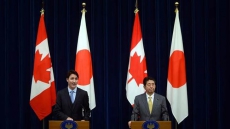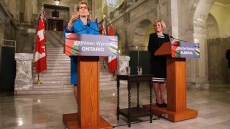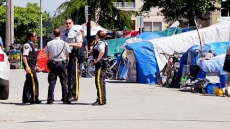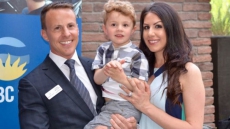OTTAWA — The federal government was tight-lipped Friday after Canada's ambassador to Ireland raised eyebrows on both sides of the Atlantic when he "pulled a Chretien" by grappling with an Irish protester at a politically sensitive commemoration in Dublin.
Global Affairs Canada did not respond to questions about breaches of diplomatic and security protocol in the wake of Kevin Vickers's angry interception of the republican protester at a military cemetery on Thursday, where invited guests — including protester Brian Murphy — were marking the death of British soldiers killed in the 1916 Easter Rising.
Prime Minister Justin Trudeau brushed off a question about the incident before departing for Canada from a G7 summit in Japan and Foreign Affairs Minister Stephane Dion flatly refused comment at a Liberal party convention in Winnipeg.
Vickers became a national hero in October 2014 for his part in shooting dead an armed assailant inside the Parliament buildings, where he served as sergeant-at-arms for the House of Commons.
The ambassador's televised take-down of Murphy at the Grangegorman Military Cemetery was greeted with widespread cheers on Canadian social media.
But experts in security and diplomacy say Vickers' decision to take matters into his own hands raises serious questions of judgment.
"From what I can see of all this, it was certainly an over-reaction on the part of the ambassador, at a minimum," said Gar Pardy, a former Canadian diplomat and director general of consular affairs.
Video of the altercation appears to show Vickers briefly chasing Murphy before forcibly wrestling him along a walkway past a stone-faced guard of honour.
Pardy said the incident may quickly blow over unless the Irish government chooses to raise a formal diplomatic complaint, which he doubts it will do. A spokesman at the Irish embassy in Ottawa said Friday he could offer no comment whatsoever on the incident.
Vickers may have been acting on instinct and training after spending 29 years in the RCMP, Veronica Kitchen, a political scientist who specializes in international security at the University of Waterloo, said in an interview.
"Protecting his own safety is OK," said Kitchen.
"But given that he was at an event about commemorating British soldiers who were killed in the Easter Rising — which is still, 100 years later, diplomatically sensitive in the United Kingdom — it was probably not a great time for him to be using force against a protester."

And Terrence Chase, a former Canadian Forces soldier who is the director of Surrey, B.C.-based Defense Intelligence Service, said in an interview that Vickers "pulled a Chretien" and should have had an assigned security escort, given the nature of the commemoration.
"Security's responsibility is to get the VIP out of the area," said Chase, whose firm provides international diplomatic security services.
"Part of our training is to prevent the VIP from harm, and sometimes that harm can be from themselves in that they'll pull a Chretien."
He was referring to former prime minister Jean Chretien's infamous 1996 chokehold on protester Bill Clennett in a Flag Day crowd in Ottawa. Chretien won public acclaim for his strongman act but, internally, the matter was considered a grave security breakdown.
Another police official, speaking on background, said Vickers put the Irish police at the event in a terrible situation, forcing their hand and creating a potentially violent confrontation where none existed.
Kitchen questioned whether Vickers' central role in the October 2014 attack on Parliament Hill made him "hyper-vigilant" — and perhaps more. She expects he'll be having a long talk with his superiors.
"He should do a personal check-in to see if it is related to anything like PTSD (post traumatic stress disorder), and of course we can't know that, nor is it really any of our business," said the academic.
"I don't think anyone looks at this event and thinks that's appropriate or normal behaviour for a Canadian diplomat."
Both Pardy and Chase stressed that while Vickers was unharmed in the altercation, the ambassador has now raised new security concerns for himself.
Irish police, they said, will have to consider whether Vickers' high-profile reaction to Murphy's peaceful demonstration may attract the violent fringe of the long-running Irish republican movement.
Chase, the former soldier, was unsparing in his assessment of the former Mountie.
"You're not RCMP any more," said the security consultant.
"If you're there as a politician, you're there as a politician. Your job is not to arrest a protester. I'm sorry, it's ego — and I'll tell the guy to his face."




